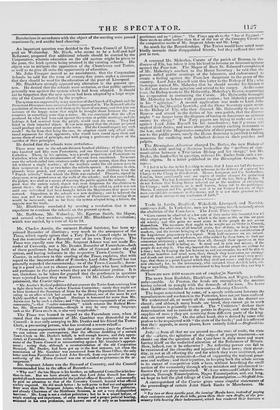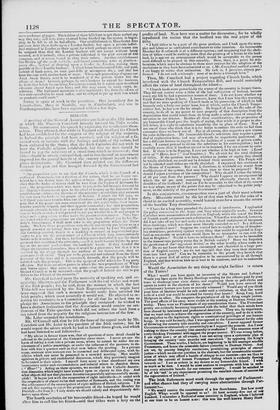Trade in Leeds, Bradford, Wakefield, Liverpool, anil Norwich continues dull.
In Yorkshire, men are beginning to talk seriously about the abolition of the Corn-laws. The Leeds Times says— C' Corn cannot be admitted at a low rate of duty under this heautifid law t. it the average price of wheat be Vs., which is the same as Sits. or 84s. for goer.: old wheat; and this price we must come to if the people do nut amass themselves. The measures that ought to be sought are an Order in Council, authorizing the admission of all bonded grain, free of duty, to keep down the markets, and the instant bringing of the Corn-laws under the consideration of the Legislature preparatory to a repeal. With half. measures we are ruined. Farmers, capitalists, and workmen, are alike robbed by these laws, to feed ova cormorant aristocracy ; and, worse than all, through their operation at this moment, bread itself is failing us. It must end in ruin and misery, if the people do not stop it. One step beyond the law, and the people are undone for a time; but, by keeping the law betwixt LH and our enemies, we will be able te tell these heartless and cruel men, that, though they have eaten our earniiip- and drunk our sweat, and paid us by taking away the pour man's only privi- lege, that there is a point beyond which they shall not come : and that point is now attained ; fur, be the aristocracy, who invented these de.vilddi laws, wil- ling or unwilling, the masses are determined to buy bread where they eau buy it cheapest."
There are now 4000 weavers out of employlin Norwich.
The news from Rochdale, Blackburn, Bolton, and Wigan, is rather unfavourable. At Preston, the hands are unemployed, the masters having refused to comply with the demands of the men. No fewer than 15,000 are included ni the turn-out.-3forniny Chronicle.
The hopes entertained by some, of a speedy settlement between the manufacturers and workmen in the Potteries, have not yet been realized We understand all, or nearly all the manufactories in the district are closed ; and although many hands are hired, they cannot go to work until business is generally resumed. The " Unionists " declare their determination not to concede the points in dispute, and state that the supplies of more y they are receiving from different parts of the king- dom are most ample. On the other hand, this is denied by some whc profess to be acquainted with "the state of the funds ;" and it is affirmed that their appeals, in many places, have entirely faileck-84i,edemee Advertise.
Jude", from all that we see around us—the state of trade, the state of the markets, the agitation of the subject of pauper treatment—we should say that the question of the Corn-laws is daily more and more forcing itself on the undivided attention of the Reformers of Britain. How, indeed, can it be otherwise ? No reflecting person can fail to be convinced of the absurdity and injustice of these laws; their absur- dity, in not at all effecting the end for which they were instituted, and are still professedly maintained—that of supporting the national great- ness and welfare ; and their injustice, in keeping back the whole nation in its career of competition with cehers, without benefiting the small section of the community through whose mistaken and misdirected in- fluence they are alone maintained. Web rye witnessedCatholic Eman- cipation, Borough Emancipation Negro Emancipation, and, ere long, we hope to hail the glad tidings Of Corn Emancipation.—Shellield Iris.
A correspondent of the Courier gives some singular statements of the proceedings of certain Joint Stock Banks in Manchester. He says- " For two or three months past, the issuing 'Banks have, instead of paying their customers cash for their bills, given them their area drafts, or else pro- missory bills bearing their indorsement, which has rendered their business a mere exchange of paper. The holders of these bills have to get them melted any way they can ; and now, every channel being blocked up, the system is begin- sing to be felt in all its bad effects. One establishment iu Manchester does not even draw these drafts upon a London banker, but upon a private indivi- dual stationed in London as their agent, for which perhaps no other reason can be assigned than that the London bankers will not accept without being covered, as it is termed ; when a private individual is the paid servant of the company, and of course bound to obey their orders. Auother establishment has thrown qf the mash rotirtly, and issued promissory notes at fourteen- pence die., ,nsicad of drawing upon a lo; like,. in London, making them payable at their London bankers'. A third house has discounted bills, and paid, enstead of bank-notes, its own post-bills at sevenpenee dis. ; and this has been the case with another bank of issue. When such proceedings disgrace our Juiut stuck Banks, need it be wondered at if the private trailer feel the effects of them ? Induced, perhaps, by such bankeis to extt.nd his business, he Gods that before he can bring his matters round, be is called upon to refund advances almost forced upon Min; and this may cause, in many cases in- solvency. The legitimate merchant is also implicated ; for, front the effects of this over-speculation he must suffer, and be obliged to put up with loss which no prudence could avert."
Swing is again at work in the provinces. One incendiary fire in _Lincolnshire, three in Norfolk, one in Cumberland, and one in Northamptonshire, have been reported within a few days.



























 Previous page
Previous page